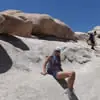4. Leave What You Find
Look but don't touch; this is a cornerstone of leave no trace. Be sure you instill this principle in your curious children, as well. Leave rocks, flowers, branches and plants where they are to avoid introducing or transporting native species to a new region. Finally, do not build structures or dig deep trenches.
5. Minimize Campfire Impacts
When backcountry camping, try to avoid building a campfire by using a small camping stove for cooking and a lantern for light at night. At established campgrounds, use the fire ring provided, keep the flames small, and be sure it's always under control. At the end of your stay, ensure all kindling and coals are burned to ash, and scatter them when they're cool.
More: 5 Simple Steps to Campfire Safety
6. Be Considerate of Other Visitors
Always be courteous to camping neighbors and others on the trails. When passing a large group, step to the side and allow them pass. And though you may like to play loud music at the campsite, or while hiking, it can be disruptive to other campers. Allow everyone to enjoy the sound of nature by keeping loud music and noises to a minimum. Leave no trace is in place to ensure everyone enjoys their stay, including you, your neighbors and the animals that live there.
7. Respect Wildlife
Wildlife responsibility is integral to leave no trace principles. Always watch animals from afar, for your safety and theirs. And never feed them; this damages their health and alters natural behavior. Finally, protect yourself and the animals by properly storing your food while you're sleeping or are away from the site.
More: Wild Animal Safety for Campers and Hikers
 Book your next camping trip
Book your next camping trip



